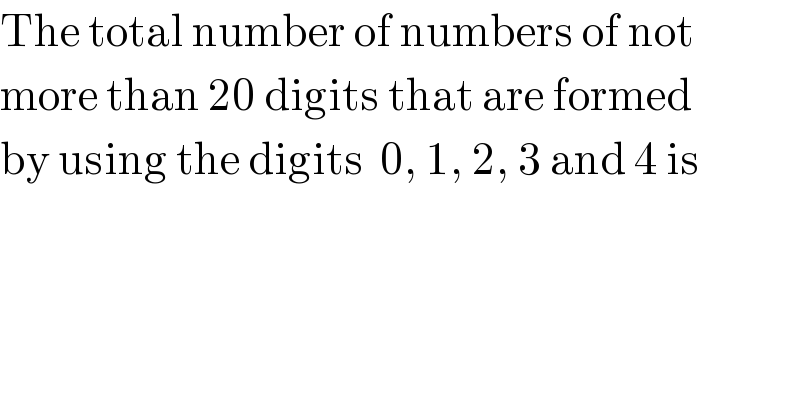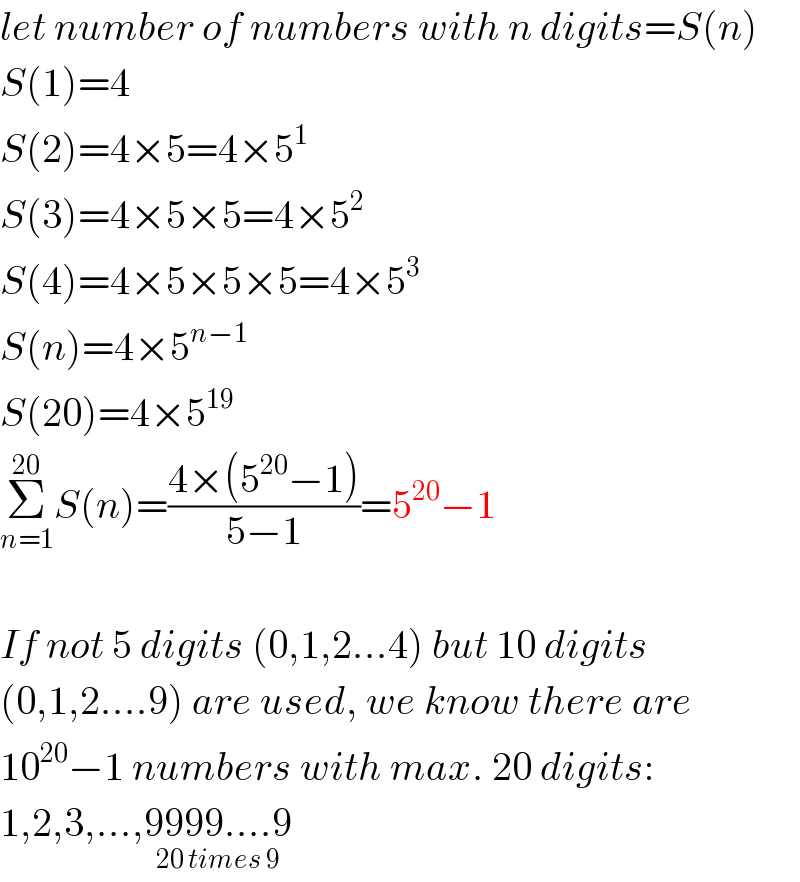Question Number 43787 by kkr1729 last updated on 15/Sep/18

$$\mathrm{The}\:\mathrm{total}\:\mathrm{number}\:\mathrm{of}\:\mathrm{numbers}\:\mathrm{of}\:\mathrm{not} \\ $$$$\mathrm{more}\:\mathrm{than}\:\mathrm{20}\:\mathrm{digits}\:\mathrm{that}\:\mathrm{are}\:\mathrm{formed} \\ $$$$\mathrm{by}\:\mathrm{using}\:\mathrm{the}\:\mathrm{digits}\:\:\mathrm{0},\:\mathrm{1},\:\mathrm{2},\:\mathrm{3}\:\mathrm{and}\:\mathrm{4}\:\mathrm{is} \\ $$
Answered by MrW3 last updated on 17/Sep/18

$${let}\:{number}\:{of}\:{numbers}\:{with}\:{n}\:{digits}={S}\left({n}\right) \\ $$$${S}\left(\mathrm{1}\right)=\mathrm{4} \\ $$$${S}\left(\mathrm{2}\right)=\mathrm{4}×\mathrm{5}=\mathrm{4}×\mathrm{5}^{\mathrm{1}} \\ $$$${S}\left(\mathrm{3}\right)=\mathrm{4}×\mathrm{5}×\mathrm{5}=\mathrm{4}×\mathrm{5}^{\mathrm{2}} \\ $$$${S}\left(\mathrm{4}\right)=\mathrm{4}×\mathrm{5}×\mathrm{5}×\mathrm{5}=\mathrm{4}×\mathrm{5}^{\mathrm{3}} \\ $$$${S}\left({n}\right)=\mathrm{4}×\mathrm{5}^{{n}−\mathrm{1}} \\ $$$${S}\left(\mathrm{20}\right)=\mathrm{4}×\mathrm{5}^{\mathrm{19}} \\ $$$$\underset{{n}=\mathrm{1}} {\overset{\mathrm{20}} {\sum}}{S}\left({n}\right)=\frac{\mathrm{4}×\left(\mathrm{5}^{\mathrm{20}} −\mathrm{1}\right)}{\mathrm{5}−\mathrm{1}}=\mathrm{5}^{\mathrm{20}} −\mathrm{1} \\ $$$$ \\ $$$${If}\:{not}\:\mathrm{5}\:{digits}\:\left(\mathrm{0},\mathrm{1},\mathrm{2}…\mathrm{4}\right)\:{but}\:\mathrm{10}\:{digits} \\ $$$$\left(\mathrm{0},\mathrm{1},\mathrm{2}….\mathrm{9}\right)\:{are}\:{used},\:{we}\:{know}\:{there}\:{are} \\ $$$$\mathrm{10}^{\mathrm{20}} −\mathrm{1}\:{numbers}\:{with}\:{max}.\:\mathrm{20}\:{digits}: \\ $$$$\mathrm{1},\mathrm{2},\mathrm{3},…,\underset{\mathrm{20}\:{times}\:\mathrm{9}} {\mathrm{9999}….\mathrm{9}} \\ $$
